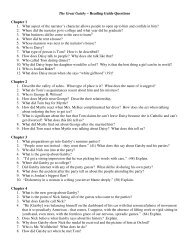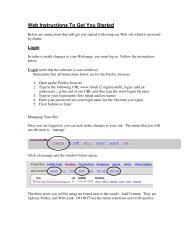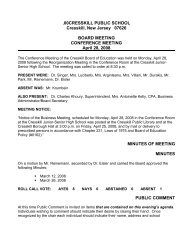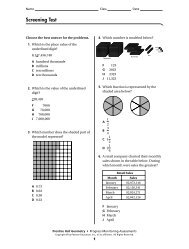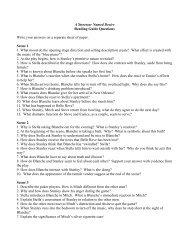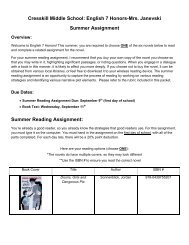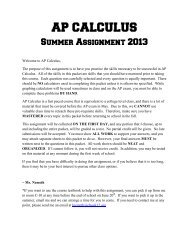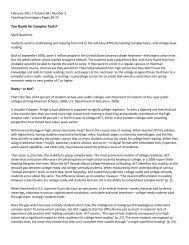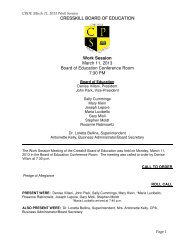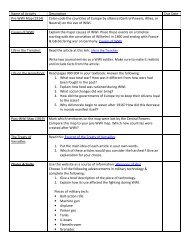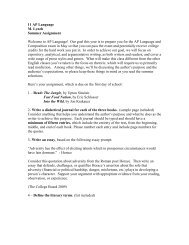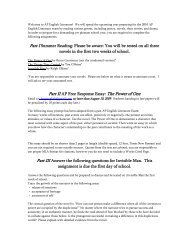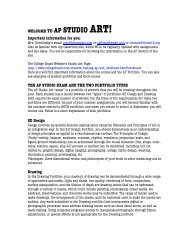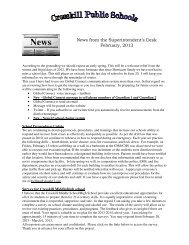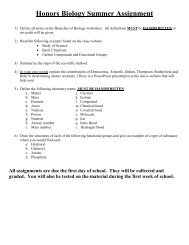Hamlet Questions (pdf)
Hamlet Questions (pdf)
Hamlet Questions (pdf)
Create successful ePaper yourself
Turn your PDF publications into a flip-book with our unique Google optimized e-Paper software.
4. Discuss the tone of <strong>Hamlet</strong>’s letter to Ophelia<br />
5. What is <strong>Hamlet</strong>’s purpose in talking to Polonius about the Sun’s breeding maggots in a dead dog?<br />
What does Polonius’ reaction (in asides) reveal?<br />
6. How do Rosencrantz and Guildenstern analyze <strong>Hamlet</strong>’s madness?<br />
7. <strong>Hamlet</strong> says to Rosencrantz and Guildenstern about their coming to see him, “I will tell you why; so<br />
shall my anticipation prevent your discovery.” What does this last phrase mean?<br />
8. What does <strong>Hamlet</strong> tell Rosencrantz and Guildenstern is the cause of his problem?<br />
9. <strong>Hamlet</strong> tells Polonius that he ought not to treat the players according to their desserts but much better;<br />
that is, according to what?<br />
10. What does “catch” mean in the last line of the act? What is <strong>Hamlet</strong> planning on doing?<br />
ACT III<br />
Scene 1<br />
1. What reasons do Claudius and Polonius give for becoming “lawful espials” to the meeting of <strong>Hamlet</strong><br />
and Ophelia?<br />
2. <strong>Hamlet</strong>’s most famous soliloquy (and perhaps Shakespeare’s most famous lines) begins, “To be or not<br />
to be…” Paraphrase the speech. In summary, why does <strong>Hamlet</strong> decide that to kill himself would<br />
be too risky? In what ways does the speech reflect <strong>Hamlet</strong>’s central problem in the play?<br />
3. Why does <strong>Hamlet</strong> urge Ophelia, “Get thee to a nunnery”? What are the two possible meanings?<br />
4. What lines suggest to you that <strong>Hamlet</strong> is aware that his conversation with Ophelia is being heard by<br />
eavesdroppers? If he senses their presence, what purpose might he have in what he says to<br />
Ophelia?<br />
5. How does Ophelia react to this interview with <strong>Hamlet</strong>?<br />
6. What conclusions does the King draw from what he overheard?<br />
Scene 2<br />
1. What is the purpose of drama, according to <strong>Hamlet</strong>?<br />
2. What does <strong>Hamlet</strong> most admire about Horatio’s character?<br />
3. How long has <strong>Hamlet</strong>’s father been dead when <strong>Hamlet</strong> and Ophelia discuss the matter before the play<br />
begins?<br />
4. What does Gertrude mean when she says “the lady doth protest too much, methinks “? What does her<br />
reaction tell us about her degree of complicity in the events that led up to her marriage to<br />
Claudius?<br />
5. Why is the play named as it is?<br />
6. What is the general tone of the comments that <strong>Hamlet</strong> makes to Ophelia before and during the play?<br />
7. How does the King react to the play?<br />
Scene 3<br />
1. Why does <strong>Hamlet</strong> not kill the King when he finds him praying? What is ironic about this inaction?<br />
Scene 4<br />
1. Why did <strong>Hamlet</strong> strike instantly at the figure behind the arras in his mother’s room?<br />
2. When <strong>Hamlet</strong> confronts his mother, how does her reaction underscore her innocence and guilt?<br />
3. What reasons does the ghost give for his second appearance?<br />
4. What does the Queen resolve to do at the end of Act III?<br />
ACT IV<br />
Scene 1<br />
1. In scene 1 of Act IV, what is the King’s major concern? In what line does he express it?<br />
2. What is the “foul disease” that the King is referring to?



